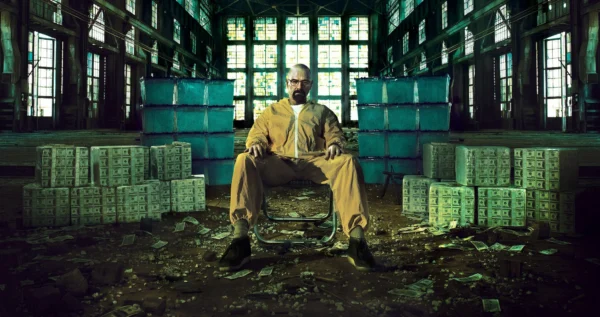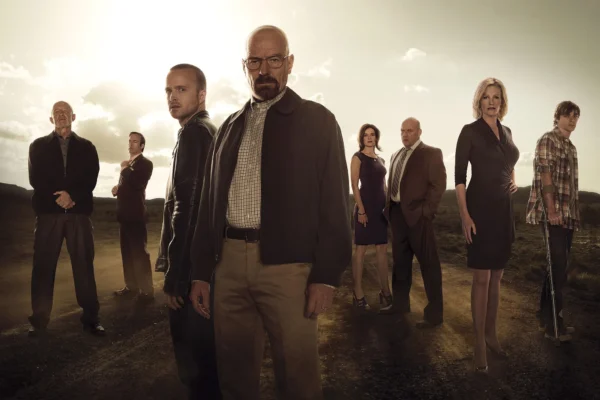Some finales wave far from the runway, but Breaking Bad ending, sticks the landing and then carves its initials into the tarmac. The story is less a conventional crime drama and more a modern tragedy, like a Shakespearean collapse staged in the unlikeliest of theatres, between car washes and fast food joints. The last chapter is a masterclass in timing, payoff and the nerve! The result is the rare send-off that feels both inevitable and surprising. No wonder people still keep talking about the Breaking Bad finale years later. It lingers like the smell of chemistry and meth in the air.
The tone of the show is a cocktail of black comedy, neo-noir and domestic drama which is stirred together with moral corrosion. The finale delivers a satisfying blend of tragedy and victory. It is blunt and bare and the punishment is without the poetry. It’s like the feeling of the door closing at exactly the right moment. If you’ve ever wanted proof that television can end well, the Breaking Bad finale is the exhibit you slide across the table with a quiet, smug smile.
In this article, we’ll chart the setup, the last stretch beat-by-beat, with sharp interpretations, the fallout for everyone and the symbols that make the ending of Breaking Bad stick!
⚠️Spoiler Warning: Heisenberg’s last experiment is best watched before it’s explained. Spoilers ahead. Read on only if you’ve seen Breaking Bad or don’t mind knowing how it ends.
Quick Premise Refresher
The story is of Albuquerque in the late 2000s. High school chemistry teacher Walter White (played by multiple Emmy winner Bryan Cranston), gets a terminal diagnosis and in panic mixed with pride and starts cooking meth with a former student Jesse Pinkman (played by Aaron Paul). What begins as a desperate plot to protect a family becomes a full-blown criminal enterprise.
The premise escalates as Walt’s mask slips. The mild mannered dad morphs into Heisenberg who is a meticulous kingpin. Skyler Walter (played by Anna Gunn) tries to hold a family together as the lies metastasize, DEA agent Hank Schrader (Dean Norris) unknowingly hunts his own brother-in-law. The show’s plot keeps putting Walt’s genius against a world that refuses to bend. Breaking Bad ending is where all those forces finally reconcile with a cost ledger only tragedy can balance.
The Final Sequence: Heisenberg’s Last Day

Walt, who is now a fugitive hiding in snowy isolation, sees Gretchen (played by Jessica Hecht) and Elliott Schwartz (played by Adam Godley) downplay his legacy on TV. With his ego back in play, Walt returns to Albuquerque with a plan. He ropes in Badger and Skinny Pete, using laser pointers to intimidate the Schwartzes into turning his $9.72 million into a trust for Walter Jr. He isn’t looking for love, he only wants control!
Walk pays Skyler one final visit. The mask slips and he tells her, “I did it for me. I liked it. I was good at it. I was alive”. He hands her the GPS coordinates to Hank’s grave, a bargaining chip for the DEA. Afterwards, he watches his son from afar and accepts that some bridges, once burned, can’t be rebuilt. The ending of Breaking Bad leaves the emotional ledger harsh but balanced.
The Firefight and the Farewell
Walt storms Jack Welker’s compound with an M60 wired in his trunk, like it’s just another tool in his kit. One click of the key fob and the gun tears through the neo Nazis. In the smoke and chaos, Jesse finally gets his shot at Todd. He delivers payback with grim precision by putting the chain around his neck. Walk offers Jesse the kill shot, but Jesse refuses by saying “Do it yourself”. Meanwhile, Lydia learns her stevia habit just became her poison, courtesy of ricin.
Walt takes a final walk through the lab, like a proud craftsman touching his legacy, only to leave it marked with a bloody handprint as the cops close in. Overhead, the camera catches him framed in eerie calm while Baby Blue plays. He didn’t get caught, he died where he felt like the most. The Breaking Bad ending gives him the epitaph he chose, all paid in blood.
What the Breaking Bad Ending Really Means

The finale of Breaking Bad isn’t just spectacle, it’s layered with meaning. Each choice Walt makes doubles as a statement on who he really was, a chemist, liar, father, monster, survivor. To unpack it, we can break the ending into a handful of sharp interpretations.
- The Engineer’s Exit: Walt treats the finale like a blueprint of laundering money through the Schwartzes, mowing down Nazis with trunk ballistics, trading GPS for leverage. His fix wasn’t meth or cash, it was control, always. The lab was his identity.
- The Confession: “I did it for me” cuts through five seasons of lies. Walt wasn’t noble, just selfish and skilled. Telling Skyler gives her clarity and the audience closure, truth finally shares the frame with spectacle.
- Revenge as Ledger: Every kill is bookkeeping. Hank’s murder, Jesse’s enslavement, Lydia’s schemes, Walt balances all the accounts. Justice here is personal, precise and cold.
- Father and Son, Twisted: The final Walt-Jesse exchange flips their roles. Walt offers death, Jesse refuses and chooses life. Their nod admits a bond ruined but undeniable.
- The Lab as Afterlife: His last walk isn’t sentimental, it’s a craftsman with his tools, mistaking legacy for love. The smile is genuine, but it’s tied to ruin. The ambivalence is why the ending really stings!
Also, read The Sopranos Ending Explained: Cut to Black, Cue to Eternal Debate
Closing Thoughts: After the Smoke Clears
The finale is a fantastic conclusion to the series because it balances heartbreak with head-nodding inevitability. Breaking Bad ending delivers closure without mercy. The truth is laid bare, the debts settled, the final experiment carried out with ruthless precision. It’s tragedy laced with triumph, knowing the perfect moment to fade to black and the perfect image to leave behind.
That image, Walt’s bloodied hand on the tank before he falls, holds the real message. You can build an empire on genius and grit, but if it’s empty of love, it’s nothing but gleaming steel. The finale doesn’t sermonize, it lets Baby Blue play and the silence afterward says it all. Not redemption, not damnation, just recognition!
Frequently Asked Questions (FAQs)
1. Did Walt actually die?
Yes. He’s mortally wounded by shrapnel from his own machine-gun rig and bleeds out in the lab. The police arrive, but he’s gone. The Breaking Bad ending makes sure he isn’t cuffed; he exits on self-authored terms.
2. Why does Jesse refuse to kill Walt?
Because it would give Walt the final say in their story. Jesse sees the wound, recognizes the manipulation pattern, and chooses a life that isn’t defined by Walt.
3. What’s the deal with “Baby Blue”?
The song nods to Walt’s blue meth and contains the line “Guess I got what I deserved,” which mirrors the finale’s moral accounting. It’s not a victory lap; it’s a wry acknowledgement that the bill came due.